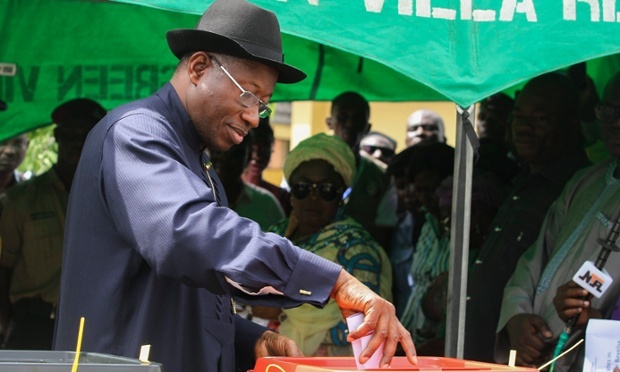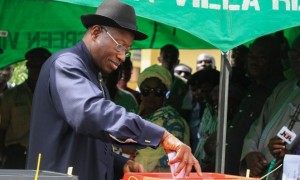There is no doubt that the just concluded presidential election on the 28th of March has been the most epochal period in the history of Nigerian elections. The brand new political awakening – precipitated by a decade mastery of the social media by the Nigerian people – which blew over the political landscape, indeed had a lot to do with the exciting nature of the elections and the electioneering process. Indeed, the March 2015 election was an election of firsts.
First, after the election results were announced, the incumbent government embodied in the person of President Jonathan, conceded defeat and congratulated Gen. Muhammadu Buhari. This is the most obvious and talked about ‘first’. The president’s panegyrists have gone so far as to nominate him for the Nobel Peace Prize; because by conceding defeat, he prevented a bloodbath, whose aftermath would have made the killing fields of Cambodia look like a stand-up comedy show. Meanwhile, Jonathan’s detractors believe it is an abhorrent thing for anyone to think about nominating him for a Nobel peace prize because he did something that should be normal – after all, his administration was scandalized by numerous cases of mismanagements and misappropriations. Some say the president did a commendable thing by conceding defeat in a free and fair election, but they leave it at that – just a commendable act, nothing more.
But one thing that might help is putting Jonathan’s act in context. Just before the election, there were reports of politically motivated vigilante and militant groups stockpiling arms and buying battle ships. A former Niger Delta Warlord said “2015 is more than do-or-die. It is our very survival that is being challenged, and we must tell them: you are a man and I am a man, we are going to meet on the battle field.”
The ruling party described the opposition as a “Nigeria’s Muslim Brotherhood”, and a “party of bloodthirsty, religious and ethnic bigots averse to the unity of the country” and even went as far as accusing them for being responsible for the blood raged Islamist group, Boko Haram, saying that the APC and its leaders are “a hypocritical lot, wolves in sheep skin, devils who, through their utterances, stoke the fires of violence by night only to wear messianic robes in the morning to shed crocodile tears for their victims.”
The Northern Elders Forum, a pressure group said that “there is no going back on the presidency returning to the North in 2015.” On the 14 of October, 2014, the same group said anyone who votes for Jonathan and the PDP in the 2015 elections would be deemed an enemy of the North.
The APC was even known to threaten the formation of a parallel government, if they lost the election, perceiving it was rigged – which would have become the grand recipe for the failure of the Nigerian state.
In the aftermath of the 2011 presidential elections after General Buhari lost the election, a bloodbath ensued leaving over 1, 000 people dead and almost 65, 000 people displaced, mostly in the north. In the face of all these, General Buhari remained tacit.
But the legendary phone call, made by President Jonathan to General Buhari, before the final results were announced, nipped whatever violence that might have erupted in the bud.
Putting all these into context, factoring the history of election violence in the country and how easy it is to incite violence across ethnic and religious line in Nigerian, one could see why indeed that sole act of President Jonathan is more than commendable.
Second, the electioneering process of the 2015 presidential elections was issues and facts based. For the first time in Nigeria, an incumbent trying to be re-elected president tried to convince the electorate by using facts and figures. To many Nigerians, numbers mean nothing, but with a growing middle class and a new political awakening – leading to more sophisticated voters – the use of facts and numbers might just be the key to getting re-elected. His administration was responsible for the construction of the Aba-Owerri road, Lokoja-Abuja road and Owerri-Port Harcourt road. In the transportation sector, the railway system was rehabilitated. Today, we can boost of functional intra-city and inter-state railway systems. These new trains are set to transport thousands of tonnes of goods and people every day, giving the Nigerian economy a serious boost. Jonathan’s effort in the agricultural sector helped reduce the importation of food from N1, 000 billion to N600 billion. President Jonathan made sure all these and many more were advertised to the Nigerian electorate, in order to secure their votes. Never had something on this scale been done before.
Finally, to win an election, a candidate must capture two out of the three regions in Nigeria. These three regions include the North, West and East – the Western and Eastern regions are collectively categorized as the South. In the past elections, General Buhari was only able to capture a majority vote in the Northern part of the country, losing to other candidates who were able to capture the other two regions. For example, the diagrams below show the numbers of states won by the presidential candidates in the 2011 election and 2015 elections respectively.
Image source: http://www.nigerianmuse.com/
In this image, one sees how regional in nature the votes were dispersed. Most of the Northern part of the country voted for Buhari, while the West and the East, i.e. the Southern part of the country was captured by Jonathan. Ribadu’s case is clearly an aberration on this list.
Image source: http://www.news24.com.ng/
In this image, it can be clearly seen that – for the first time – General Buhari was able to capture most of the Northern and the Western part of the country. The west was the tipping point for General Buhari to secure his victory.
Indeed, one could say the democratization process is finding its voice in the Nigerian state, and Nigeria might just be on its way to becoming one nation and not merely a country of many nations.
The transcript of the congratulatory phone call goes thus:
President Jonathan: Your Excellency
General Buhari: Hello, Your Excellency.
President Jonathan: How are you?
General Buhari: I am alright, Your Excellency.
President Jonathan: (laughs) Congratulations.
General Buhari: Thank you very much, Your Excellency.
President Jonathan: Yeah, so how are things?
General Buhari: Well, I would congratulate you more…
President Jonathan: One of these days, you should come so we can sort out how to plan the transitional period.
General Buhari: Thanks, Your Excellency, Thank you very much.
President Jonathan: Okay… Congratulations.
General Buhari: My respect, Your Excellency…
About the Writer: Tam Kemabonta is a writer on a wide range of topics and also blogs at www.tamalexblog.wordpress.com




